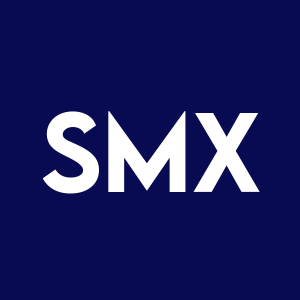SMX and Singapore's ASTAR Alliance Set Global Benchmark for Plastics Recycling (NASDAQ:SMX)
Rhea-AI Summary
SMX (NASDAQ:SMX) has achieved a groundbreaking partnership with Singapore's national research agency ASTAR to implement the world's first national plastic passport program. This government-backed infrastructure embeds SMX's molecular-level traceability technology into Singapore's plastics framework, enabling verifiable tracking of plastics from origin through recycling.
The system transforms plastics into investable resources through the Plastic Cycle Token (PCT) framework, allowing verified recycled inputs to be priced, traded, and financed as standardized assets. With Singapore processing 957,000 tonnes of annual plastic waste, this initiative represents a significant shift from voluntary compliance to enforced, verifiable recycling practices.
This partnership positions SMX as the architect of a new market, drawing parallels to the evolution of carbon credits and ESG reporting systems, with potential for global expansion particularly across ASEAN and European markets.
Positive
- First-ever national plastic passport program implementation with government backing
- Strategic positioning as the standard-bearer for plastic recycling verification systems
- Potential for global expansion as other countries adopt similar frameworks
- Creation of new revenue streams through Plastic Cycle Token (PCT) framework
Negative
- Heavy dependence on government adoption and regulatory frameworks
- Success relies on broader market acceptance and standardization
- Implementation complexity across different jurisdictions and regulatory environments
News Market Reaction – SMX
On the day this news was published, SMX declined 27.38%, reflecting a significant negative market reaction. Argus tracked a peak move of +32.9% during that session. Argus tracked a trough of -34.8% from its starting point during tracking. Our momentum scanner triggered 87 alerts that day, indicating high trading interest and price volatility. This price movement removed approximately $1M from the company's valuation, bringing the market cap to $3M at that time. Trading volume was very high at 4.8x the daily average, suggesting heavy selling pressure.
Data tracked by StockTitan Argus on the day of publication.
NEW YORK, NY / ACCESS Newswire / September 3, 2025 / Market inflection points are often hard to recognize until they've already revealed the winners. Carbon credits in the early 2000s. ESG reporting systems in the 2010s. Each began as a niche concept, often dismissed as a policy experiment or compliance burden. But once governments codified them into regulation, the companies at the forefront didn't just grow; they defined categories, captured billions in enterprise value, and rewrote the playbook for sustainability-linked markets.
That's why Singapore's launch of the world's first national plastic passport program, built with SMX (NASDAQ:SMX) and its national research agency ASTAR, is so significant. This is not a pledge or a pilot. It is government-backed infrastructure. By embedding SMX's molecular-level traceability technology directly into Singapore's plastics framework, the country has signaled that recycling will no longer be based on voluntary reporting or fragmented pilots. It will be governed by proof, verified at the material level, and enforced at the policy level.
For SMX, the opportunity is immense. It's the equivalent of a defense contractor winning a sovereign contract in a sector worth billions. The difference is that plastic recycling is not confined to one nation's defense budget; it's a multi-billion-dollar global market with no functioning backbone until now. Singapore just delivered that backbone, and SMX is the company carrying it.
Parallels to Carbon Credits and ESG Compliance Tech
The path from niche innovation to mainstream adoption in sustainability has clear precedents. When carbon credits first emerged, skeptics dismissed them as abstract accounting tricks. Yet once compliance frameworks were built, markets materialized, capital flowed, and the companies enabling verification and trading became indispensable. The same pattern played out with ESG compliance technology. At first, companies cobbled together spreadsheets and consultants. Then governments, investors, and regulators demanded real-time, auditable reporting- and the platforms that could deliver it created enduring shareholder value.
SMX is now positioned at the same tipping point. Its patented molecular markers are embedded directly into plastics, metals, textiles, and natural rubber, giving every item a scannable, tamper-resistant identity tied to a verified digital passport. That data follows goods from origin through use, recycling, and chemical transformation, proving recycled content, authenticity, and chain of custody in real time. The result is enforceable compliance, anti-counterfeiting, and true material efficiency that converts sustainability from promise to measurable value.
Singapore's plastic passport program showcases this power in practice. With SMX embedded at the national level, the country can ensure that every plastic product, from industrial resins to consumer packaging, carries a traceable, verifiable lifecycle. That's not just policy; it's monetization. Just as carbon credits turned emissions reductions into financial assets, SMX's system transforms plastics into investable resources. And with the Plastic Cycle Token (PCT) framework layered on top, verified recycled inputs can now be priced, traded, and financed as standardized assets.
Inflection Point for Investors
Inflection points are defined not when technologies are proven, but when policy catches up and enforces them. Singapore has done precisely that, turning plastic recycling into national infrastructure rather than voluntary compliance. With 957,000 tonnes of annual plastic waste and a high reliance on incineration, the country has a real incentive to make this work.
But the bigger picture is regional and global. ASEAN has already outlined plastics sustainability as a core policy priority, while Europe is building digital product passport frameworks across materials. Singapore's model, powered by SMX technology, provides the first working template that others can adapt.
For stakeholders, that signals leverage far beyond one contract. It means SMX now owns the reference architecture for national plastics programs. Singapore is the proof-of-concept. The prize is replication across dozens of other markets with similar mandates.
Consider how this played out in carbon. The first registries and verification platforms didn't just win one geography; they scaled globally, cementing themselves as standards. Their market caps grew not linearly but exponentially, because they sat at the center of a new compliance-driven economy. SMX's role in plastics recycling points to the same trajectory.
SMX Is The Architect Of A New Market
SMX now occupies rare territory: both a technology enabler and a market architect. It has proven capability at the molecular level, and it now has government validation at the national level. That is the recipe for an inflection point; where a story shifts from possibility to inevitability, and from early adopter risk to broad market upside.
Singapore may be the first chapter, but for SMX, it represents only the beginning. The plastics market is vast, fragmented, and desperate for a solution that unites environmental ambition with financial incentive. SMX has shown it can deliver that solution. Those who recognize the parallel to past sustainability markets will see this moment for what it is: a structural shift; the kind that redefines not only a company's trajectory but a country's path to proving that plastics can be managed as assets, not liabilities.
References
https://www.fortunebusinessinsights.com/recycled-plastic-market-102568#:~:text=The%20global%20recycled%20plastics%20market,share%20of%
2060.55% 25% 20in%202023.https://australiainstitute.org.au/post/carbon-credits-and-offsets-explained/
National Environment Agency (NEA). Waste & Recycling Statistics 2014 - 2023. Singapore: NEA; 2024.
Shunpoly.com. "How Much Plastic Is Wasted Each Year in Singapore?" Accessed 5 August 2025.
National Environment Agency (NEA). Waste-Statistics & Overall Recycling (interactive dashboard). Updated 2024; accessed 5 August 2025.
National Environment Agency (NEA). Mandatory Packaging Reporting portal. Accessed 5 August 2025.
Singapore Statutes Online. Environmental Public Health (Public Cleansing) Regulations - Incineration gate-fee schedule; revised 2024.
National Environment Agency (NEA). "New Licensing Regime for General Waste Disposal Facilities." Technical brief & dialogue-session slides; 2024.
Nasdaq.com. "SMX Announces Planned Launch of World's First Plastic Cycle Token." Press release; 2024.
Yahoo! Finance. "SMX Plastic Cycle Token Is a Functional Market-Driven Solution…" News article; 2024.
Los Angeles Tribune. "Carbon Credits Had Their Day… Now the SMX Plastic Cycle Token…" Feature article; 2025.
National Environment Agency (NEA). Refuse Collection Fees for Households. Revised 2024; accessed 5 August 2025.
About SMX
As global businesses face new and complex challenges relating to carbon neutrality and meeting new governmental and regional regulations and standards, SMX is able to offer players along the value chain access to its marking, tracking, measuring and digital platform technology to transition more successfully to a low-carbon economy.
Forward-Looking Statements
The information in this press release includes "forward-looking statements" within the meaning of the Private Securities Litigation Reform Act of 1995. Forward-looking statements include, but are not limited to, statements regarding expectations, hopes, beliefs, intentions or strategies regarding the future. In addition, any statements that refer to projections, forecasts or other characterizations of future events or circumstances, including any underlying assumptions, are forward-looking statements. The words "anticipate," "believe," "contemplate," "continue," "could," "estimate," "expect," "forecast," "intends," "may," "will," "might," "plan," "possible," "potential," "predict," "project," "should," "would" and similar expressions may identify forward-looking statements, but the absence of these words does not mean that a statement is not forward-looking. Forward-looking statements in this press release may include, for example: matters relating to the Company's fight against abusive and possibly illegal trading tactics against the Company's stock; successful launch and implementation of SMX's joint projects with manufacturers and other supply chain participants of gold, steel, rubber and other materials; changes in SMX's strategy, future operations, financial position, estimated revenues and losses, projected costs, prospects and plans; SMX's ability to develop and launch new products and services, including its planned Plastic Cycle Token; SMX's ability to successfully and efficiently integrate future expansion plans and opportunities; SMX's ability to grow its business in a cost-effective manner; SMX's product development timeline and estimated research and development costs; the implementation, market acceptance and success of SMX's business model; developments and projections relating to SMX's competitors and industry; and SMX's approach and goals with respect to technology. These forward-looking statements are based on information available as of the date of this press release, and current expectations, forecasts and assumptions, and involve a number of judgments, risks and uncertainties. Accordingly, forward-looking statements should not be relied upon as representing views as of any subsequent date, and no obligation is undertaken to update forward-looking statements to reflect events or circumstances after the date they were made, whether as a result of new information, future events or otherwise, except as may be required under applicable securities laws. As a result of a number of known and unknown risks and uncertainties, actual results or performance may be materially different from those expressed or implied by these forward-looking statements. Some factors that could cause actual results to differ include: the ability to maintain the listing of the Company's shares on Nasdaq; changes in applicable laws or regulations; any lingering effects of the COVID-19 pandemic on SMX's business; the ability to implement business plans, forecasts, and other expectations, and identify and realize additional opportunities; the risk of downturns and the possibility of rapid change in the highly competitive industry in which SMX operates; the risk that SMX and its current and future collaborators are unable to successfully develop and commercialize SMX's products or services, or experience significant delays in doing so; the risk that the Company may never achieve or sustain profitability; the risk that the Company will need to raise additional capital to execute its business plan, which may not be available on acceptable terms or at all; the risk that the Company experiences difficulties in managing its growth and expanding operations; the risk that third-party suppliers and manufacturers are not able to fully and timely meet their obligations; the risk that SMX is unable to secure or protect its intellectual property; the possibility that SMX may be adversely affected by other economic, business, and/or competitive factors; and other risks and uncertainties described in SMX's filings from time to time with the Securities and Exchange Commission.
EMAIL: info@securitymattersltd.com
SOURCE: SMX (Security Matters) Public Limited
View the original press release on ACCESS Newswire







